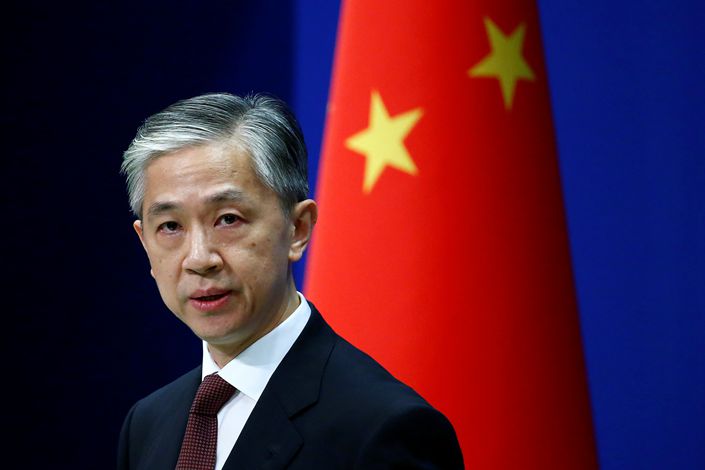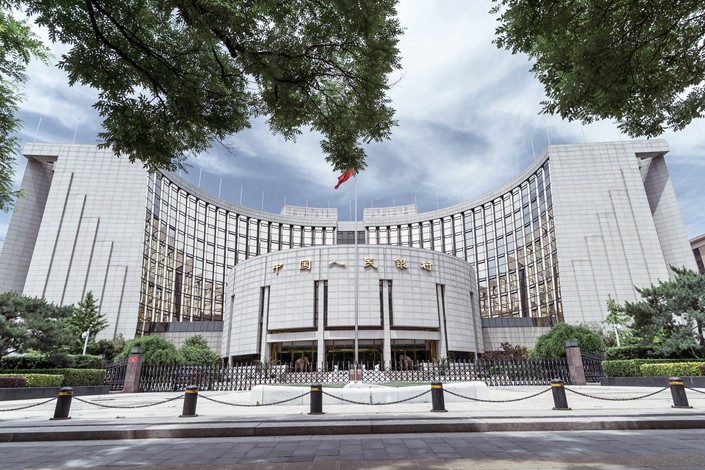CX Daily: China halts Hong Kong extradition treaties with U.K., Canada, Australia

Hong Kong /
China suspends Hong Kong extradition and mutual legal assistance treaties with Britain, Australia, Canada
China’s foreign ministry said Tuesday that it suspended Hong Kong’s extradition and mutual legal assistance treaties with Britain, Australia and Canada in apparent retaliation for the three countries’ previous decisions to halt extraditions to the special administrative region.
The three countries along with New Zealand all stopped extraditions to Hong Kong since early July, citing concerns over Beijing’s sweeping national security law for the territory.
Hong Kong legislator and former Secretary for Security Regina Ip Lau Suk-yee told Caixin Tuesday that Beijing’s order to suspend crime-related assistance agreements was a strong countermeasure and would deal a heavy blow to the West.
FINANCE & ECONOMICS
 |
Commercial banks are required to submit data on online joint consumer lending by the end of July. |
Banking /
Banks told to report data on consumer lending via Ant’s platforms
Shortly after China’s banking regulator issued new rules for online loans, the central bank started conducting a survey of commercial banks’ joint online consumer lending, indicating that regulators want to get a clear grasp of the $1 trillion market.
The People’s Bank of China sent the survey notice to commercial banks asking them to submit online consumer lending data as of December 2018, June 2019, December 2019 and the first six months of 2020, Caixin learned from banking industry insiders. Specifically, the central bank required separate data on loans through Ant Financial’s lending platforms, Huabei and Jiebei.
The central bank didn’t clarify the purpose of the survey. A person close to the central bank told Caixin it is a normal day-to-day function for the central bank to carry out research on various financial products.
Indexes /
MSCI plans to launch A-share thematic investing indexes
Index provider MSCI Inc. said it will launch a series of thematic indexes based on China’s A-share market within one year.
MSCI will consider two aspects for index construction: where investment opportunities are in the capital market, and global and local investors’ interests and needs, said Douglas Walls, head of Index Product Asia Pacific of MSCI, at a conference Tuesday. Wei Zhen, head of index solutions research at MSCI Asia Pacific, called for Chinese regulators to further address market access issues and bring China’s market mechanism more in line with international standards. Globally, MSCI has launched nine thematic investing indexes, which are designed to capitalize on opportunities created by macroeconomic, geopolitical and technological trends.
Economy /
Opinion: China’s fiscal dilemma
"The Chinese government is therefore likely to face a dilemma in the second half of this year," writes Yu Yongding, a former president of the China Society of World Economics and director of the Institute of World Economics and Politics at the Chinese Academy of Social Sciences, in a commentary. "If it loosens fiscal policy, public finances will worsen significantly. But if it cuts expenditure to offset the revenue shortfall, growth will be lower, with dire consequences."
"In my view, China should be firm in adopting an expansionary fiscal policy aimed at accelerating economic growth," Yu writes. "The government should issue more bonds to finance additional infrastructure investment, and the People’s Bank of China should adopt various policy measures to facilitate this, including quantitative easing (QE) if necessary."
Trusts /
Regulators step in as Sichuan Trust fails to secure shareholder funding
Financial regulators stepped in with enforcement actions against Sichuan Trust Co. Ltd. as the troubled trust company failed to obtain capital support from major shareholders to resolve a repayment crisis involving $3.6 billion of investments that has dragged on since May.
The Sichuan branch of the China Banking and Insurance Regulatory Commission (CBIRC) ordered Sichuan Trust to suspend repayments of some trust products, affecting both institutional and individual investors, Caixin learned from sources close to the matter.
The CBIRC branch in southwest China’s Sichuan province confirmed last week that it took enforcement measures against Sichuan Trust as the company violated industry rules, putting investors’ interests at risk. It was the first time regulators formally addressed the violations of the mid-sized trust company since its credit crisis came to light in May.
Quick hits /
Provincial courts based rulings on legal document that doesn’t seem to exist
BUSINESS & TECH
 |
Arm China, which plays a strategic role in Beijing’s attempt to build a self-reliant semiconductor industry, has been locked in a bitter fight with its British parent company over the management of the Chinese unit since the end of May. Photo: Nikkei Asian Review |
Chips /
Arm China asks Beijing to intervene in row with U.K. parent
Arm China called on the Chinese government to step in and “protect” the chip designer from its parent, Softbank-controlled British chip designer Arm Ltd., adding an explicitly political dimension to the ongoing dispute between the two companies.
In a statement released Tuesday and signed by more than 200 employees, Arm China said it “is a Chinese-controlled joint venture that should abide by the Chinese laws and fulfill the social responsibility in China. We plead with the government to pay attention to the turbulence Arm China is facing now and intervene to protect this strategic asset.” The statement was posted on the company’s official WeChat account.
The Chinese unit also posted the same statement on its official Weibo account, tagging the accounts of dozens of governments, local courts, police authorities and state-backed media.
TikTok /
Japanese ruling party pushes for limits on TikTok
Japan’s ruling party will urge the government to restrict the use of Chinese-developed apps like TikTok and better protect sensitive information, aiming to ensure that the country can keep working closely with the U.S. on security matters.
Members of Prime Minister Shinzo Abe’s Liberal Democratic Party met with experts Tuesday to start discussing new recommendations that could be proposed as early as August. The move forms part of a broader push in the LDP for tighter controls on the handling of sensitive information. Japan’s debate on TikTok comes amid growing concerns that this app and others are being used to collect personal data for the Chinese government. TikTok is believed to have more than 10 million users in Japan, many of them younger people.
U.S. senators worry TikTok could be used to interfere in elections
Luxury /
China ‘revenge spending’ offsets plunge in luxury goods revenue
Luxury goods companies' profits dived across the board in the first half of 2020 as people avoided extravagances and stayed inside during the coronavirus pandemic — but it wasn’t bad news everywhere, with the China market providing a glimmer of hope.
French luxury multinational LVMH Moet Hennessy Louis Vuitton SE's profits plunged 28% in the first half. But LVMH highlighted a strong rebound in the China market and Asia more broadly in a reversal of the trend elsewhere. Chinese consumers on both online and offline luxury shopping sprees were a bright spot, with leading luxury brands recording an uptick in what analysts call “revenge shopping” as shoppers started stepping into malls again and splurging as they emerged from quarantine.
Energy /
Five things to know about the titan reshaping China’s energy landscape
China’s latest state-owned infrastructure titan, PipeChina — formally the China Oil & Gas Pipeline Network Corp. — drew attention this month when it kicked off acquisitions from the country’s biggest oil and gas companies worth hundreds of billions of yuan.
The company is at the center of a major restructuring of China’s energy sector. What is PipeChina? What is the underlying strategy? How far along is the plan? Why is PipeChina paying a premium for the assets? Here are five things you need to know about PipeChina and the country’s changing energy landscape.
Quick hits /
Tech Talk: Could Tencent turn ‘search dog’ Sogou into Baidu-killer?
Conglomerate Sanpower has a plan to deal with $9.3 billion in debt
Moutai profit rises 13% as China liquor market shows resilience
Thanks for reading. If you haven't already, click here to subscribe.

- 1China Officials Dismiss Tax Hike Rumors After Tech Selloff
- 2Cover Story: How Gutter Oil Became a Prized Fuel for International Airlines
- 3Maersk Unit Takes Over CK Hutchison Panama Ports After Court Ruling
- 4Prominent Chinese Journalist Liu Hu Detained by Police in Chengdu
- 5China Provinces Set Cautious 2026 Growth Targets
- 1Power To The People: Pintec Serves A Booming Consumer Class
- 2Largest hotel group in Europe accepts UnionPay
- 3UnionPay mobile QuickPass debuts in Hong Kong
- 4UnionPay International launches premium catering privilege U Dining Collection
- 5UnionPay International’s U Plan has covered over 1600 stores overseas



